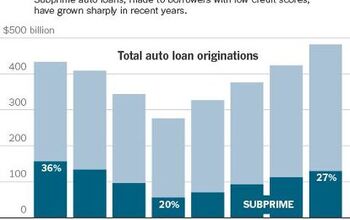TTAC In The New York Times

Ed Niedermeyer is too humble to say it, so it’s left to me: Ed just had his second third op-ed piece in the New York Times. Required reading. Two core sentences:
“In particular, what Mr. Obama called his “one goal” — having Detroit “lead the world in building the next generation of clean cars” — is nowhere near being achieved. While the idea of improving G.M.’s and Chrysler’s fuel efficiency was doubtless a politically popular justification for the bailout, American consumers have not embraced the goal with equal fervor. Sales of fuel-sipping compact and subcompact cars have actually dropped this year, while pickup and sport utility vehicle sales grew by double-digit percentages.”
Honestly: Trying to tell customers what to buy fails. You have to make what they want. If they want dualies, give them dualies. It (still) is a free country. The mind-altering abilities of advertising are vastly overrated.
“And if Detroit’s slipping into bad old habits wasn’t distressing enough, the bailouts have created a perverse new dynamic. With G.M. stock now being publicly traded on Wall Street, taxpayers have every incentive to cheer on the bailed-out automaker as it overproduces vehicles and pushes cheap credit. After all, the sooner G.M.’s stock hits a certain level — likely around $52 per share — the sooner the Treasury can sell its remaining equity and get taxpayers out of risk.”
True, very true.

Bertel Schmitt comes back to journalism after taking a 35 year break in advertising and marketing. He ran and owned advertising agencies in Duesseldorf, Germany, and New York City. Volkswagen A.G. was Bertel's most important corporate account. Schmitt's advertising and marketing career touched many corners of the industry with a special focus on automotive products and services. Since 2004, he lives in Japan and China with his wife <a href="http://www.tomokoandbertel.com"> Tomoko </a>. Bertel Schmitt is a founding board member of the <a href="http://www.offshoresuperseries.com"> Offshore Super Series </a>, an American offshore powerboat racing organization. He is co-owner of the racing team Typhoon.
More by Bertel Schmitt


































Comments
Join the conversation
Thanks for the update on Uncle Sam's patients. It's important to note that what you describe is good for the bottom lines of these companies. Unfortunately these companies don't operate in a vaccuum. The trend back to gas guzzlers by consumers is bad for our trade deficit (half oil). The trend is bad for the future of these companies, since the possibility exists (it has happened before) that the US will become a country with expensive fuel simply due to market forces, while other countries become cheap fuel countries has zero probability. So these companies are limiting their market. There are numerous other reasons this trend is bad both for the companies (lack of technical development, overreliance on high margin low tech vehicles) and the country. But people rarely do things that are good for the country, yes? We've been picking at the carcass so long that it is almost bare. For those that think you can't build a house with a compact car, you are wrong. I built a house with a compact car and a trailer which replaced a full size pickup truck - because the car was better in every respect for the purpose. Knack box built in - check (the trunk). 40mpg - check (cheap to operate, more profit in my pocket). Carried one ton - check (trailer, tilting, 12 inch load height, can be dropped at the site). Carried 4 workers - check (four door). Sold for more than I bought it 3 years later - sell a compact in 2006 and you make money.
GM hasn't produced what customers want for 50-years. They wanted good, safe, reliable cars. GM gave them poo-poo on a stick.
The first rule of automotive journalism is that the more "independent" (re: critical) the coverage of individual automakers, the more important it is to show your unwavering support for the industry's knee-jerk opposition to environmental, safety and pro-labor policies. Yes, there are exceptions, such as Dan Neil. But their rarity proves the rule.
As a past newspaper editor, I had serious problems with the inconsistencies in Niedermeyer's NYTimes Op-Ed and would have sent it back for rewrite. He selects Detroit as being at blame for consumers' rejection of fuel-efficiency, while acknowledging that all manufacturers are primarily moving gas guzzler vehicles. Foreign manufacturers are not criticized for their behavior, and it's not really "Detroit" that is the focus but GM and Chrysler, the bailout twins, since there is nary a mention of Ford. One would think that an editor-in-chief at TTAC would understand the lead time required for the development of new automotive product. Today's product was developed during the Bush administration, not Obama's. One does not move the world in 18 months. There is no mention of Fiat's involvement in Chrysler, and that Fiat leads European manufacturers in fuel efficiency or that Fiat has developed new technology for spark ignition engines that will revolutionize that segment as it did for diesels with its common rail injection. We all know Daimler turned Chrysler into a truck company, that it left Chrysler with a horrible non-truck product line, and that Cerebrus was clueless. For an editor from a website which believes in consumers' right to freedom of choice, it's quite remarkable that Niedermeyer should take the opposite tack and now blame Detroit and Obama (indirectly) for not forcing more fuel efficient cars on buyers. The more interesting question the op-ed did not address is the socio-economic class of today's new car buyers. Who are they? Who has the money, in today's economy, to invest in expensive product? Are we looking at a non-standard cross-section of the buying public? Are we perhaps seeing primarily higher income buyers participating in the market, and are lower income buyers, for whom fuel efficiency and lower purchase cost are primary considerations, sitting it out?